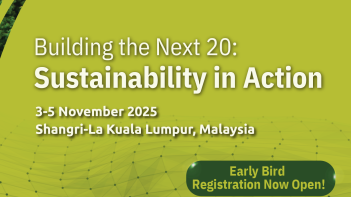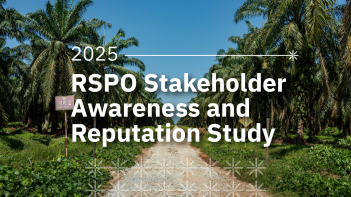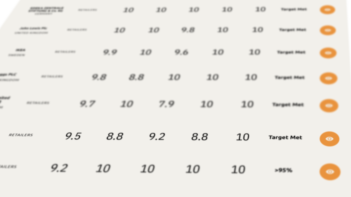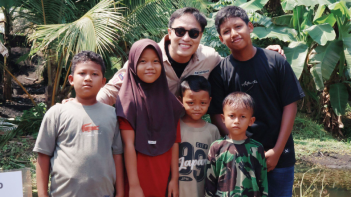Titi Bonsilon is an RSPO certified independent smallholder in Sabah who exemplifies the modern-day sustainable farmer. To the untrained eye, his five-hectare plot looks like any other oil palm farms dotting the Beluran district of Sabah, Malaysia. On a closer look, the vibrant green trees look healthy and lush with ample ground cover, and palm fronds neatly stacked in rows.
Titi’s farm is the de facto ‘model’ farm where neighbouring farmers pop in to visit and learn. The Malaysian Palm Oil Board (MPOB) uses his farm to conduct training programmes for other farmers. Farm visitors include agriculture experts, European Parliament members, foreign agriculture ministers and World Bank officials.
Titi’s story began in Toniting village, a settlement set up in the early 1990s. The villagers were mainly indigenous Orang Sungai and Kadazan who moved from the Ulu Sapi area when the logging companies ceased operations. They were given plots of land for agricultural purposes and many started planting oil palm. Today, out of its population of 420, there are 100 oil palm farmers.
“When my father was working in the logging industry, he couldn’t afford to send my siblings to school. Palm oil became our lifeline. It helped put my siblings through school and improved our standard of living,” said Titi, 41, the first in his family to complete high school education.
In Malaysia, there are 250,299 independent smallholders cultivating about 16.8% (979,892 ha) of the country’s total oil palm area (based on MPOB’s 2018 figures). But unlike supported or “scheme” smallholder counterparts such as Felda (Federal Land Development Authority) growers, farmers like Titi typically receive no or limited training, funding, and technical support. Due to the lack of planting know-how and resources to buy fertilisers and quality seedlings, or replant old palms, independent farmers are less efficient than other producers.
Nevertheless, in 2013, Titi and 41 other smallholders in Toniting made waves when they became the first independent smallholder group in Malaysia to be certified under the RSPO Group Certification Standard.
The Toniting farmers were part of the pilot Wild Asia Group Scheme (WAGS) project initiated by Kuala Lumpur-based social enterprise Wild Asia. WAGs provides free technical advice, training, and capacity building to help these farmers to meet certification standards and improve their farm management practices sustainably.
Prior to joining WAGS, Titi thought he had an edge on his peers because of his decade-old experience at Toniting Properties, a Beluran-based small grower. As a field conductor, he oversees the plantation and trains and supervises the workers.
“I learned so much from the WAGS programme,” Titi shared.
“For example, I switched from blanket spraying to circle or selective spray and control my weeds manually through slashing or grass cutting. My ground cover improved, resulting in healthier soil and trees. I saved lots of money because my herbicide use decreased from 82 litres to 30 litres per year,” he added.
Titi uses organic fertilisers like Empty Fruit Bunches (EFB) and decanter cake to supplement chemical fertiliser. Sapi mill, where Titi sells his fruit, provides EFB and decanter cake for free; farmers only have to pay to transport the organic fertilisers to their farms. Sapi mill is part of Wilmar International-owned PPB Oil Palms Berhad.
Within a year, Titi reaped the benefits from the organic fertilisers when his yields increased from 20 to 24 tonnes per hectare per year. He also signed up for the fertiliser scheme offered by Sapi mill. In this scheme, Sapi mill supplies fertilisers to smallholders on credit and in turn, it would deduct a sum from their sales for three consecutive months when they sell the fresh fruit bunches to the mill.
When palm oil prices were good (averaging RM450-500 per tonne), Titi raked in over RM3,500 a month from his crops, which makes up 70% of his monthly income. The other 30% comes from his salary at Toniting Properties.
“Palm oil has helped pay for my kids’ education, and allowed me to apply for bank loans, purchase a car, and build our house,” said the father of five, whose kids’ ages range from 10 to 16.
Six years on, Titi is still one of the top producers in the Beluran area, and his sustainable farming practices continue to inspire other farmers in Sabah. He is also MSPO (Malaysian Sustainable Palm Oil) certified.
Titi is passing on his knowledge from managing his own farm to his workers at Toniting Properties who are working towards their MSPO certification this year. However, Titi isn’t resting on his laurels. With the current low for palm oil prices in the market, he, like all farmers, feels the pinch.
“Our monthly expenses are five figures, so I can’t rely 100% on palm oil. My next challenge is to find alternative crops or income,” Titi explained.
Keep reading

Good News: RT2025 Early Bird Registration Extended!

Extension of RSPO Excellence Awards 2025 Submission Deadline!
Call for Expression of Interest: Ghana National Interpretation Task Force for 2024 RSPO Principles and Criteria (RSPO P&C)
Call for Expression of Interest: Côte D’Ivoire National Interpretation Task Force for 2024 RSPO Principles and Criteria (RSPO P&C) and Independent Smallholder (ISH) Standard

RSPO Gains Global Recognition in 2025 Stakeholder Study

Top 9 Retailers In Europe Committing To Sustainable Palm Oil

Register for RT2025 Early Bird Offer while it lasts!





